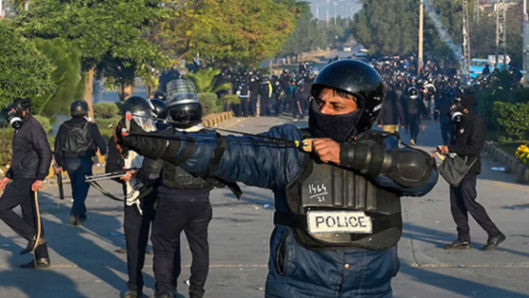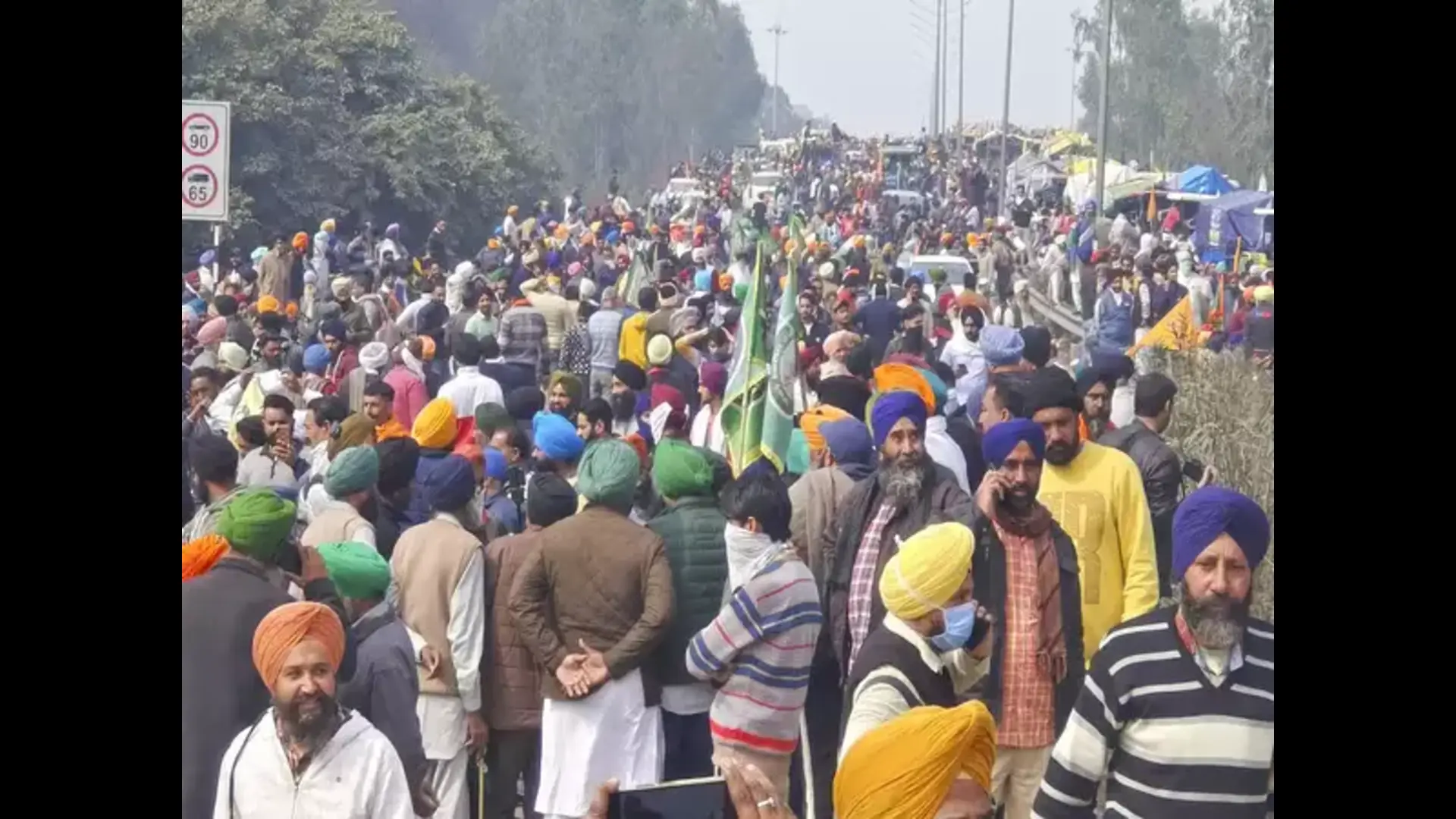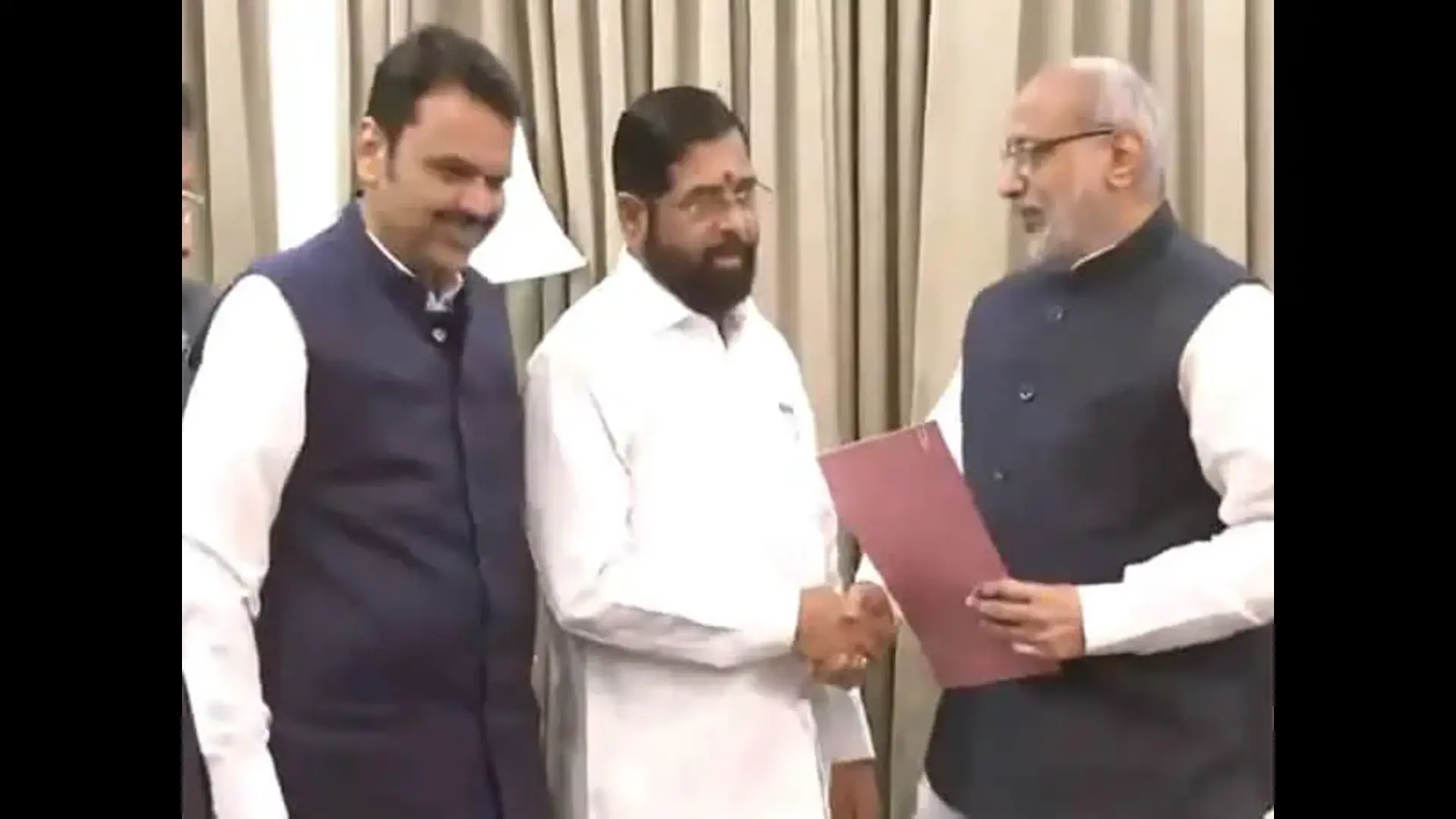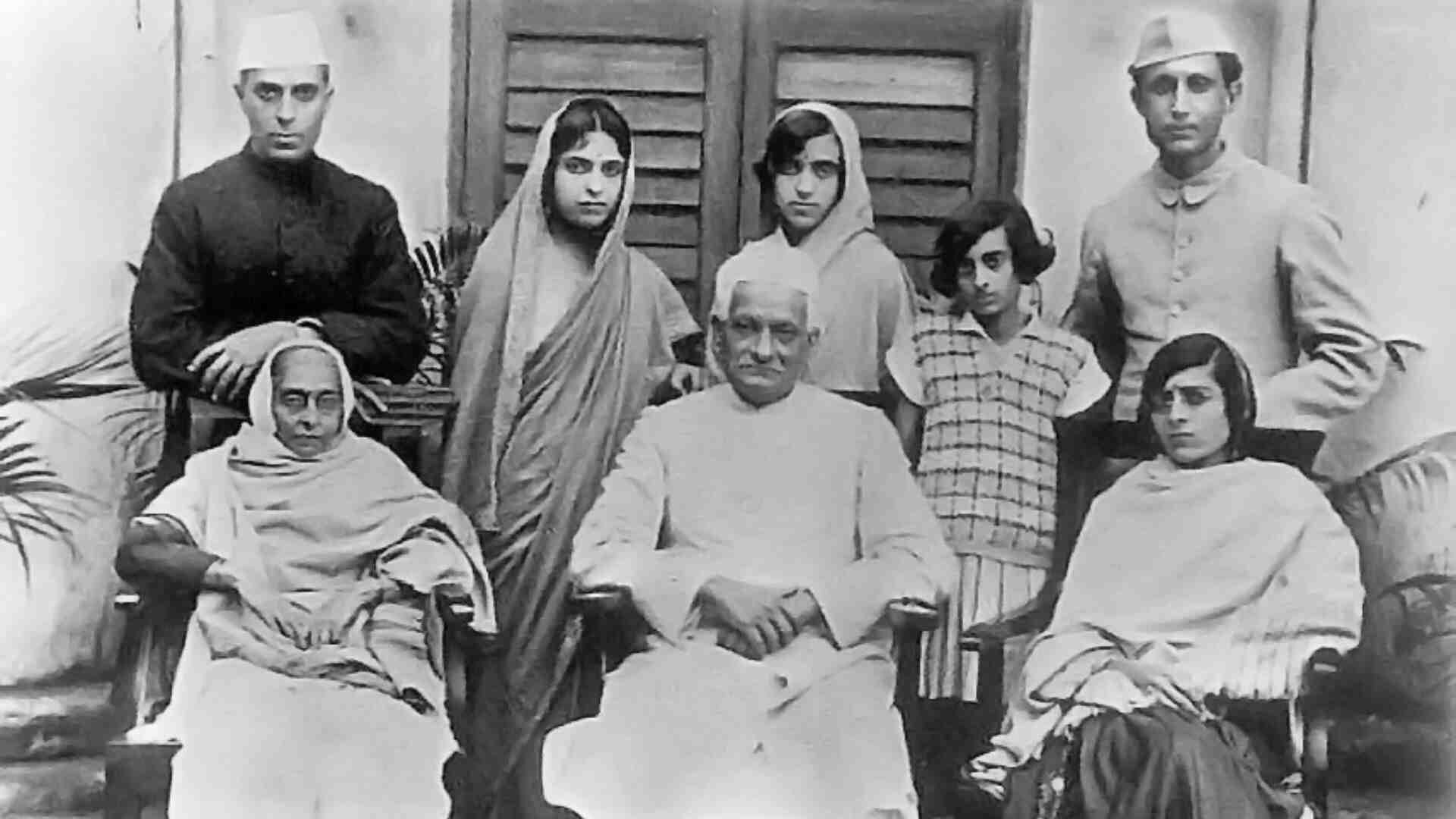
Dynastic politics has been a defining feature of Indian politics for decades, with both the Congress and the BJP exhibiting elements of this trend, though in different ways. While the Congress Party’s leadership is more overtly tied to the Nehru-Gandhi family, dynastic influences are also present in regional politics and, to a lesser extent, in the BJP. Critics argue that dynastic politics weakens democratic values by prioritising familial ties over merit, while its defenders point to the experience and continuity it can provide. Nevertheless, it remains a central theme in the discourse around modern evolving democracy.

Despite the rise of democratic systems, dynastic politics persists in modern democracies, particularly through political families that dominate parties and electoral systems.
The Kennedys in the United States: One of the most famous examples of a modern political dynasty, the Kennedy family has been active in U.S. politics since the early 20th century. John F. Kennedy served as President (1961–1963), and his brothers Robert and Edward (Ted) Kennedy held significant political roles, with the family continuing to influence American politics today.

The Nehru-Gandhi family in India: As mentioned earlier, the Nehru-Gandhi family has shaped Indian politics for generations. Starting with Jawaharlal Nehru, India’s first Prime Minister, followed by his daughter Indira Gandhi and her son Rajiv Gandhi, the family remains influential in the Congress Party.
The Bhutto-Zardari family in Pakistan: Zulfikar Ali Bhutto founded the Pakistan People’s Party (PPP) in 1967, and his daughter Benazir Bhutto became the first female Prime Minister of Pakistan. The family’s political legacy continues through Bilawal Bhutto Zardari, who is currently active in Pakistani politics.
The Marcos family in the Philippines: After Ferdinand Marcos’ presidency (1965–1986), which ended in a dictatorial rule, his family returned to power with Imelda Marcos and their son Ferdinand “Bongbong” Marcos Jr., who became president in 2022.
The Eyadéma family in Togo: Gnassingbé Eyadéma ruled Togo for 38 years (1967–2005), and his son, Faure Gnassingbé, succeeded him as president.
The Kabila family in the Democratic Republic of the Congo: Laurent-Désiré Kabila led a rebellion to become president in 1997, and after his assassination, his son, Joseph Kabila, took over and ruled until 2019.
Problem with dynastic politics in modern democracies
India: Political dynasties are deeply entrenched, with the Gandhi family being a prominent example. Rahul Gandhi, the latest political figure from this family, has inherited much of his political clout, despite performance criticisms. Dynastic control is common across Indian politics, leading to nepotism and weakening of democratic meritocracy. Research shows that dynastic politicians tend to underperform compared to non-dynastic ones, especially when power is inherited across generations, leading to inefficiency and economic setbacks in regions dominated by political families.

The Philippines: Political dynasties continue to dominate, particularly with the rise of Ferdinand Marcos Jr. in the 2022 elections. His presidency signals the resurgence of a family dynasty that has historically faced accusations of corruption and authoritarianism. The dominance of families like the Marcoses stifles political diversity and reinforces cronyism, as positions of power are passed within the family.

United States: The Bush and Clinton families are prime examples of dynastic influence. Both families have produced multiple presidential candidates, shaping political power across generations. Although the U.S. operates under a highly competitive political system, dynasties still manage to sway elections, often discouraging fresh leadership and diverse political representation.

In modern Indian politics, dynastic politics remains a contentious issue, with both major parties—BJP and Congress—often accusing each other of nepotism. Prime Minister Narendra Modi has frequently attacked Congress for its reliance on the Nehru-Gandhi family, criticising it as emblematic of “parivaarvaad” (dynasty rule). He claims dynastic politics undermines democracy and promotes corruption.
However, the BJP is not immune to these allegations. Several BJP leaders, such as Jyotiraditya Scindia, Anurag Thakur, and Piyush Goyal, come from political families. Scindia, originally from Congress, is now a BJP leader, and his son has also been active in his political campaigns. This has led critics to point out the contradiction in the BJP’s stance, accusing it of selectively embracing dynastic leaders while publicly opposing the practice.
For instance, in states like Karnataka, figures like B.S. Yediyurappa and his family wield significant influence, challenging the BJP’s anti-dynasty narrative. In defence, BJP leaders often argue that their dynastic members are not “launched” but earn positions through hard work.
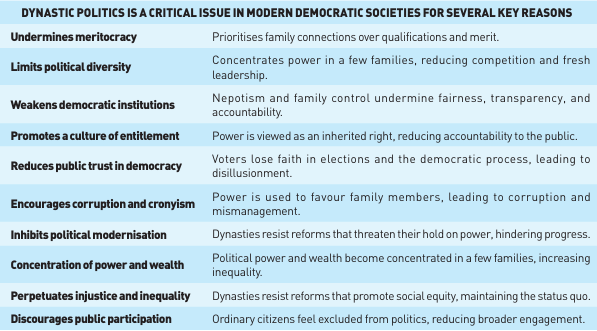
Historical background
Ancient and medieval eras: Dynastic politics is rooted in monarchies and empires, where leadership passed down within royal families. In ancient Rome, the Julio-Claudian dynasty ruled for nearly a century, starting with Augustus. Succession through family lines ensured continuity but often led to internal conflicts, as seen during the reign of Nero. In medieval India, the Mughal Empire exemplified dynastic rule, with emperors like Akbar and Shah Jahan transferring power through hereditary succession. British royalty also followed dynastic principles, with the Plantagenets and Tudors shaping England’s governance, maintaining power through familial lines. These dynasties not only consolidated power but often justified their rule through divine or cultural mandates, intertwining politics and lineage.
Transition to democracy: With the rise of democratic systems in the modern era, dynastic politics transformed but did not disappear. While democratic principles emphasised merit-based leadership and electoral choice, political families continued to exert influence. In the U.S., the Kennedy family became synonymous with political leadership, spanning multiple generations. In India, the Nehru-Gandhi family dominated the Congress Party, starting with Jawaharlal Nehru, followed by Indira Gandhi and later generations. These families maintained political power through elections rather than inheritance, yet their prominence reflects a continued reliance on family legacy in shaping political dynasties within democratic frameworks. Thus, dynastic politics adapted, coexisting with democratic ideals in various nations.
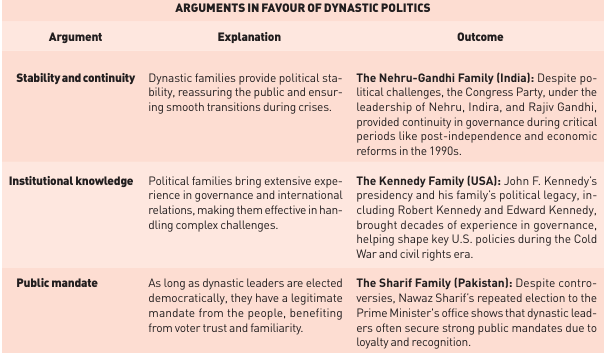
Efforts to curb dynastic politics
Legal reforms: Examples of legal reforms to promote transparent elections in India include electoral bonds, introduced in 2018, which allow anonymous donations to political parties, although they have been criticised for lacking transparency. Another reform is linking Aadhaar to voter ID to prevent duplicate entries and reduce voter fraud, an initiative by the Election Commission of India. Campaign finance reforms have capped anonymous cash donations at Rs 2,000 to limit the influence of unaccounted wealth. Additionally, term limits for elected representatives have been proposed to prevent the concentration of political power, often benefiting dynastic families.
Political education and awareness: Voter education is critical in reducing dynastic influences. Efforts such as introducing the “None of the Above” (NOTA) option in Electronic Voting Machines (EVMs) empower voters to reject unfit candidates. Additionally, civic programs and media campaigns raise awareness of the downsides of dynastic politics, such as nepotism and a lack of fresh ideas. These initiatives encourage citizens to choose leaders based on merit rather than family background.
Promotion of meritocracy: Indian political parties are being urged to adopt internal democracy to curb nepotism and dynastic politics. The Law Commission’s 170th report highlights the need for transparent candidate selection, while internal revolts, such as the INC’s Group of 23, call for reforms. The Election Commission of India (ECI) is recommended to have stronger oversight to enforce internal elections. Additionally, amending the Anti-Defection Law is proposed to reduce centralised control and promote merit-based leadership.
Compiled by Ruchira Talapatra
